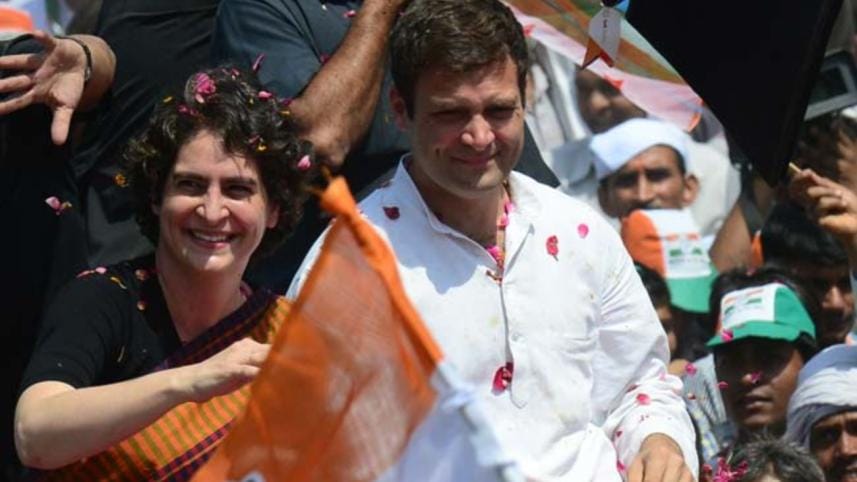Has the poison done its work?

Is Priyanka Gandhi Vadra the antidote to those seeking the demise of the Indian National Congress party, one of the contintent's oldest political parties?
This week and in the midst of news of far greater moment from around Asia, India is being asked to focus its energies on the latest instalment of a long-running soap opera that ought either to have ended or been taken off the air a few years ago. This episode has left hanging a question that those writing the script hope will prove tantalising – will Priyanka Gandhi Vadra play a larger role in national politics and lead her party's campaign for crucial polls next year in India's largest province? The fact some people, including commentators across Asia, should consider the answer pivotal is itself surprising for the question has been around long enough to have become boring.
When one of the continent's oldest political parties slips into terminal decline, it is an event worth noting if only because the party in question, the Indian National Congress, once inspired legions of anti-colonialists around Asia (and Africa). Its leaders were icons, but it was the sheer weight of their ideological confabulations as they tried to chart a path for a country on the cusp of freedom that made them interesting.
You could scoff at them today for having debated a mixed economic model for as long as they did; you could ask how naïve non-alignment was in a post-war world bitterly divided by ideology or you could raise puzzled eyebrows at the oddities of their most illustrious member, the man Indians embraced as the father of their free nation. But beginning about this time last century and arguably until the turn of this one you could not ignore the Congress because there was no questioning its leaders' commitment to the idea of building a nation, of wanting a better world. The Congress showed a way, a promise of hope, to people far away from India's shores.
Today, drawn like a moth to the flame by Narendra Modi's 2014 electoral battle-cry for a Congress-free India, the party seems determined to transform its rival's promise into prophesy. Party loyalists argue that success and failure are cyclical in politics, that today's ruling Bharatiya Janata Party (BJP) was once reduced to two seats in Parliament and that the Congress worm too shall one day turn.
They choose to forget that the BJP was less than a decade old when it recorded that dismal electoral score or that it had never ruled except as part of a short-lived makeshift coalition. But crucially they forget that the BJP re-invented itself in more ways than one to progress from two seats in 1984 to 262 in 2016.
The ground is slipping away from beneath the Congress' feet. From 11 (out of 29) states it ruled within India's federal structure when it was unseated from the Centre in 2014, it is in charge now in five and is a part of shaky coalitions in two others. With the exception of the southern state of Karnataka, the rest are insignificant in terms of their representation in Parliament. In effect, according to one calculation, the Congress now rules just six per cent of India.
Since 2014, when it lost the parliamentary election, the Congress has suffered one political blow after another without once having counter-punched. In any other democratically run party of the world, this would have led at the very least to tough questions being asked of the leadership but more likely to a change. Within the Congress, led by two members of one family for more than a decade, these serial disasters have led to the hope that a third member of the same family might agree to play a larger political role along with the original two.
It is this prescription more than anything else that suggests the party's decline is terminal. For it speaks of a belief that political fortunes are made or marred by individuals, by their names and their faces, and not by their ideas or their vision. To believe that Priyanka Gandhi will resuscitate the Congress because she looks – or as some Congressmen insist, walks – like her grandmother, the redoubtable Indira Gandhi, is about as emphatic a proclamation of decline as anything could be.
Is it unfair, you may ask, to be so dismissive of a young lady possessed with charisma, and arguably her grandmother's walk?
To begin with, the lady is not so young; at 44, she is older than her great grand-father Jawaharlal Nehru was when he was elected president of the Congress party or her grandmother Indira Gandhi was when she attained that position. By the time he was 44, her father Rajiv Gandhi was both the focal point of his party and Prime Minister of India.
Next, she has during a decade spent on the fringes of active politics never once been accused of offering a profound thought on the course governance ought to take. Besides Priyanka's occasional repartee during election campaigns, India knows little about her politics or priorities; the country doesn't even know if there is anything to know."
Third, she is married to an individual who has managed to become the focal point of corruption investigations by both a commission of inquiry and the country's Enforcement Directorate.
Finally, a larger role for her would be tantamount to admission that her brother, Rahul, the putative Gandhi heir and party vice-president, has failed to make the cut.
The tragedy from India's perspective is that the Congress appears driven to self-destruct at a time when its once-famed inclusive secularism may be needed the most. If Priyanka Gandhi is the antidote to those seeking a Congress-free India, the poison may already have done its work.
The writer is Editor,The Statesman (India).

 For all latest news, follow The Daily Star's Google News channel.
For all latest news, follow The Daily Star's Google News channel.
Comments